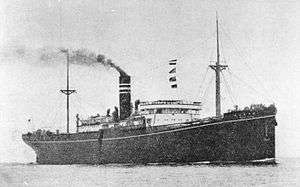Lisbon Maru
 | |
| History | |
|---|---|
| Name: | SS Lisbon Maru |
| Owner: |
|
| Builder: | Yokohama Dock Company, Yokohama |
| Laid down: | 15 October 1919 |
| Launched: | 31 May 1920 |
| Completed: | 8 July 1920 |
| Fate: | Torpedoed off Dongfushan in the Zhoushan Archipelago 1 October, and sank on 2 October 1942 |
| General characteristics | |
| Class and type: | Freighter |
| Tonnage: | 7,053 GRT |
| Length: | 135.6 m (444 ft 11 in) |
| Beam: | 17.7 m (58 ft 1 in) |
| Depth: | 10.4 m (34 ft 1 in) |
| Installed power: | 632 nhp |
| Propulsion: | 2 × triple expansion steam engines |
| Speed: | 12 knots (22 km/h; 14 mph) |
| Capacity: | 28 passengers |
Lisbon Maru (里斯本丸) was a Japanese freighter which was used as a troopship and prisoner-of-war transport between China and Japan.
When she was sunk by USS Grouper (SS-214) on 1 October 1942, she was carrying, in addition to Japanese Army personnel, almost 2,000 British prisoners of war captured after the fall of Hong Kong in December 1941. Over 800 of these men died either directly as a result of the sinking, or were shot or otherwise killed by the Japanese while swimming away from the wreck. The ship should have carried appropriate markings to alert Allied forces to the nature of its cargo but did not do so.
A reunion of survivors was held on board HMS Belfast on 2 October 2007 to mark the 65th anniversary of the escape. Six of the former prisoners attended, alongside many bereaved families of escapees.
Aftermath
A memorial was placed in the chapel of Stanley Fort, Hong Kong, which was moved to the chapel of St. Stephen's College, Hong Kong, due to the change of sovereignty of Hong Kong.
In Popular Culture
- The UK band Fuck Buttons included a song called "The Lisbon Maru" on their album Tarot Sport.
- Tom Hickox has recorded his own composition "The Lisbon Maru".
See also
References
External links
- The fall of Hong Kong which led to transportation of prisoners on the Lisbon Maru
- The full roll of those who perished on the Lisbon Maru
- Sinking of Lisbon Maru
- Time to Unseal the Lison Maru Incident, an incomplete documentation of the rescue effort made by local Chinese fishermen
- IWM Interview with survivor George Bainborough
- IWM Interview with survivor Jack Hughieson
- IWM Interview with survivor Charles Jordan
- IMW Interview with survivor Andrew Salmon
- IWM Interview with survivor Montague Truscott
- IWM Interview with survivor Alf Shepherd
Further reading
- Tony Banham (2006). The Sinking of the Lisbon Maru: Britain's Forgotten Wartime Tragedy. Hong Kong University Press. ISBN 978-962-209-771-1.
Coordinates: 30°13′48″N 122°45′54″E / 30.23°N 122.765°E